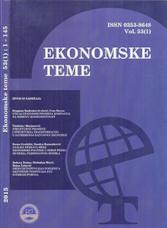Economic Themes (2015) 53 (1) 8, 119-141
Bojan Rupić, Ljiljana Bonić
Abstract: Investors have become the most important users of financial statements in modern business conditions, and mixed base of financial reporting has been established in order to meet their information needs and it includes elements of the concept of historical cost and the fair value concept, with an increasing shift towards fair value concept. The primary task of fair value accounting becomes the expression of the fair value of the net assets at the reporting date, while the financial results represents the change in fair value of net assets between the two reporting periods. In our country the application of the "full IFRS" is mandatory for large enterprises and the application of IFRS for SMEs is mandatory for small and mediumsized entities, thus fair value accounting becomes an integral part of the financial statements of domestic companies. However, fair value accounting is not suitable concept for our country characterized by shallow and underdeveloped financial market, companies whose owners are the company managers at the same time, and low level of economic and technological development. A financial statement audit in terms of use of fair value concept becomes much more demanding and complex than the audit of the financial statements based on historical cost accounting.
Keywords: fair value concept; IAS / IFRS; IFRS 13: Fair Value Measurament; financial statement audit
THE FAIR VALUE CONCEPT SPECIFICS IN FINANCIAL REPORTING AND AUDITING
Bojan Rupić, Ljiljana Bonić
Abstract: Investors have become the most important users of financial statements in modern business conditions, and mixed base of financial reporting has been established in order to meet their information needs and it includes elements of the concept of historical cost and the fair value concept, with an increasing shift towards fair value concept. The primary task of fair value accounting becomes the expression of the fair value of the net assets at the reporting date, while the financial results represents the change in fair value of net assets between the two reporting periods. In our country the application of the "full IFRS" is mandatory for large enterprises and the application of IFRS for SMEs is mandatory for small and mediumsized entities, thus fair value accounting becomes an integral part of the financial statements of domestic companies. However, fair value accounting is not suitable concept for our country characterized by shallow and underdeveloped financial market, companies whose owners are the company managers at the same time, and low level of economic and technological development. A financial statement audit in terms of use of fair value concept becomes much more demanding and complex than the audit of the financial statements based on historical cost accounting.
Keywords: fair value concept; IAS / IFRS; IFRS 13: Fair Value Measurament; financial statement audit

